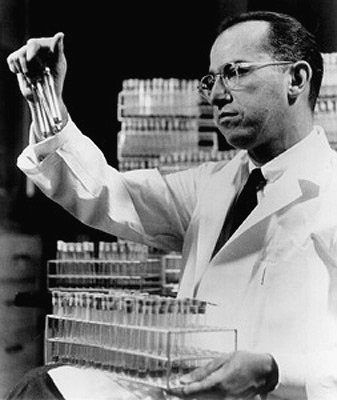The virus poliomyelitis, or polio, had ravaged America's youth for over a century, causing mass paralysis and death in thousands of infants and children each year. Jonas Salk was one of the scientists tasked with finding a way to eliminate polio's devastating effect on the public. "The eldest son of Russian immigrant parents. Neither his mother nor his father had the chance to finish their own schooling, but they pushed all three boys to do so" (Never Forget). The encouragement from his parents lead Salk to graduate from the City College of New York. During his time at college Salk met both his wife and Dr. Thomas Francis Jr. Salk and Dr. Thomas would later collaborate on some of Salk's most important experiments, including his work with influenza and eventually polio. Salk's years of effort and toil over a disease that did not directly affect him saved millions of lives around out the world. Salk made both personal and financial sacrifices to improve the lives of people he did not know. By creating the polio vaccine, Salk undoubtedly saved countless people from a terrible fate; his accomplishment however, does not make him a hero. Instead, his strong work ethic, sense of humility, and unwavering selflessness make Salk stand out as a hero.
 |
In 1955, polio was one of the first viruses to be effectively "cured" using antibodies made widely available to the American public. This feat was only possible after Salk devoted many hours of diligent work to understanding polio for nearly an entire decade. Jonas Salk's strong work ethic led directly to the discovery of a cure. After seeing the negative effects of the polio virus in his community, and recognizing the potential means to a cure through a previously neglected area of microbiology, Salk began his research. Even after following this path to its conclusion and discovering the vaccine Salk kept himself immersed in science, turning his attention to the HIV virus. His previous work was so encouraging that: "In the early 1990s, many people looked to him as the one who might finally develop a vaccine against the HIV virus" (Jonas Salk). "The work was not that promising. However, many of Salk's ideas concerning immunotherapy have caught on in current AIDS research" (Jonas Salk). Salk's methods and ideas were so brilliant and ahead of his time that even now, 50 years later, we still use his techniques in modern science. His devotion to science did not come without personal loss; in 1968 his wife Donna divorced him because of the amount of time he spent away from her, and their children, in his lab. Salk, seeing the need for a cure drove himself to spend countless hours and long days developing a vaccine.
Both during and after Salk's work on the polio virus he maintained a sense of humility and selflessness. After eight years of hard work and the discovery of the vaccine Salk realized that if the vaccine was to spread quickly and be widely available he would have to choose not to patent it. "Salk refused to patent his vaccine to profit from it personally. He wished to see it used as widely as possible and as quickly as possible. Within 10 years, polio cases in the United States dropped from 45,000 to less than 1,000 in 1962" (A Calculated Risk). By refusing to patent his vaccine Salk ensured that it would be mass-produced, and therefore readily available to the public. For his break-through discovery Salk instantly became a celebrity, and was shoved into the media spotlight. "The success of the trial catapulted Salk to instant stardom... Wishing to escape from the glare of the limelight, Salk turned down the countless offers and tried to retreat into his laboratory" (Jonas Salk). Despite the chance to become famous and wealthy for his invention Salk instead continued to focus on his work, choosing to avoid the media. When fellow scientists accused Salk of being: "Little more than a publicity hound. Salk, who claimed that he had been motivated by only the highest principles, was deeply hurt"(Jonas Salk). Jonas Salk once said: "To a scientist fame is neither an end nor a means to an end. The reward of a thing well done is the opportunity to do more" (Jonas Salk).
 |
Through his work ethic, humility, and selflessness Jonas Salk inspires me and others to strive for greatness while helping those around us. He is my hero and inspiration because he dedicated ten years of his life curing a disease affecting others, and refused to take advantage of their misfortune, instead choosing not to benefit from his findings. With Salk's eradication of polio: "Americans found hope where there had been none" (A Calculated Risk). He gave hope to an entire country, and helped propel medical science into a new era. He was humble and charitable, putting the well being of others in front of his own, and served as a pillar of moral character among the scientific community. Without Jonas Salk's revolutionary methods our world would be extremely different; polio would have claimed more lives, and the quality of life for those who did survive would be much worse.
Works Cited
Denenberg, Dennis. "Never forget." Cobblestone Sept. 2010: 45+. Gale Student Resources In Context. Web. 23 Mar. 2012.
"Jonas Salk." Newsmakers. Detroit: Gale, 1995. Gale Student Resources In Context. Web. 24
Mar. 2012.
"Jonas Salk." Notable Scientists from 1900 to the Present. Ed. Brigham Narins. Detroit: Gale Group, 2008. Gale Biography In Context. Web. 23 Mar. 2012.
Lusted, Marcia Amidon. "A calculated risk." Cobblestone Jan. 2011: 26+. General Reference Center GOLD. Web. 25 Mar. 2012.
Page created on 7/3/2013 7:18:59 PM
Last edited 10/23/2018 1:53:38 AM
